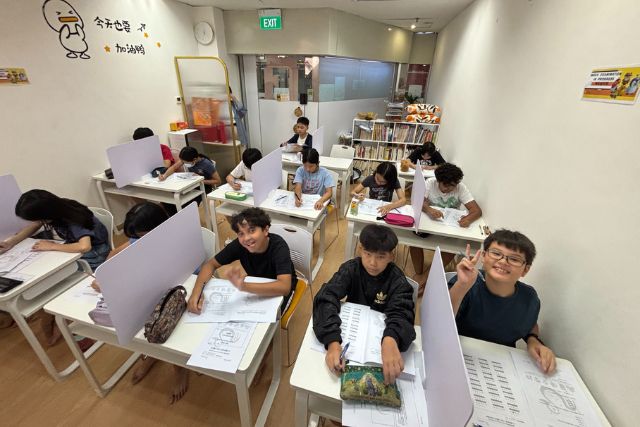It is hard to get through a day without speaking. Many parents and teachers would probably agree that sometimes, there is even too much talking!
But why do students still struggle with the Oral component of the English examination?
Every time, we ask for something, give an opinion, tell a friend about the latest game release, we may think that this is essentially practice. Except that it isn’t.
Instead of just ‘talking’, here are activities to help Primary School children improve and excel in their oral examination.
Activity #1: Reading Along Tag
Boosts reading confidence
Reading aloud is a component of the exam but the bigger picture is the opportunity to provide confidence and deeper reading skills.
Taking turns to read aloud with your child will not only give good practice, but by sharing the load, they will get more out of the story. Where there are unknown words, you can help them get them right rather than avoiding them.
Activity #2: Ham It Up
Practise speaking with emotions
Books with dialogue are useful for developing reading aloud skills in general but are really useful for understanding the story itself when told with emotion.
First read through the dialogue together, just to practise saying it.
Then look for clues about how the characters might have said it.
In novels, there might be adverbs but in comics, how things are said is driven by the picture context – fear, doubt, panic, joy.
Talk to your child about the clues and re-try the dialogue. Understanding the emotions and motivations of a character can really help comprehension and can improve inference based question scores.
Activity #3: Speak like an expert
Forming coherent sentences
Teachers and parents know their children well but this can also lead to a problem. We can fill in the gaps when given partial, incomplete and probably unclear answers as we can make inferences from the situation or the mood of the child. That doesn’t help coherent communication.
If you are asking your child about ‘Why are friends important?’ and get replies such as ‘play games’, ‘make me happy’, ‘boring without them’, encourage the ideas but ensure that you work with them to reformulate the answer into actual sentences.
If your child cannot form a sentence on their own, model an answer for them using their ideas.
Activity #4: Distraction!
For concentration and focus
Other than ‘just’ speaking, there are all kinds of other dynamics happening during an oral exam.
Not only nerves but new rooms, a wobbly chair/table leg, strange noises coming from outside (and inside) to name a few, can distract students. One way around this is to add distractions when practising.
While answering questions on a theme, challenge your child to complete a task at the same time. E.g. build a tower, draw a picture, complete some simple Maths questions. The point is to keep answers coherent without getting distracted by the additional task.
It can be really hard but fun too.
Activity #5: Give us a minute… or 15/30/45 seconds
Structure ideas more clearly
This is an old parlour game but a great one for practicing fluency.
The task is to talk about a theme without repetition and hesitation for 60 seconds. A full minute is very difficult to achieve (try it and see) so building up is essential. Make sure that you have a go and recycle themes regularly to help your child develop extra examples and ideas to base their answers.
There are common oral task themes e.g. friendship, but real ‘Give-us-a-minute’ aficionados can talk about anything.
So, the next time you are waiting for your waiter, attempt 15 seconds on Why chips are better than candy or Why ketchup is superior to mayonnaise or Justify the three least healthy options on the menu. This will definitely make the wait shorter and more constructive.
Helping your child gain confidence not only to speak out but to structure their ideas clearly will help them improve their oral grades.
One of the reasons that we are so keen to encourage this in our students at Lower Primary is that if students can explain and extend their ideas well, it means that they can write about them too. This is fundamental to developing strong composition skills in Upper Primary.
This article is contributed by Charlie Spiller, Head, Primary Courses British Council.
British Council’s Primary course focuses on building important comprehension and composition skills to help students excel at PSLE English.
* * * * *
Enjoyed reading this or learned something new? Click the Like and Share button below!
Want to be heard and seen by over 100,000 parents in Singapore? We can help! Leave your contact here and we’ll be in touch.






























































